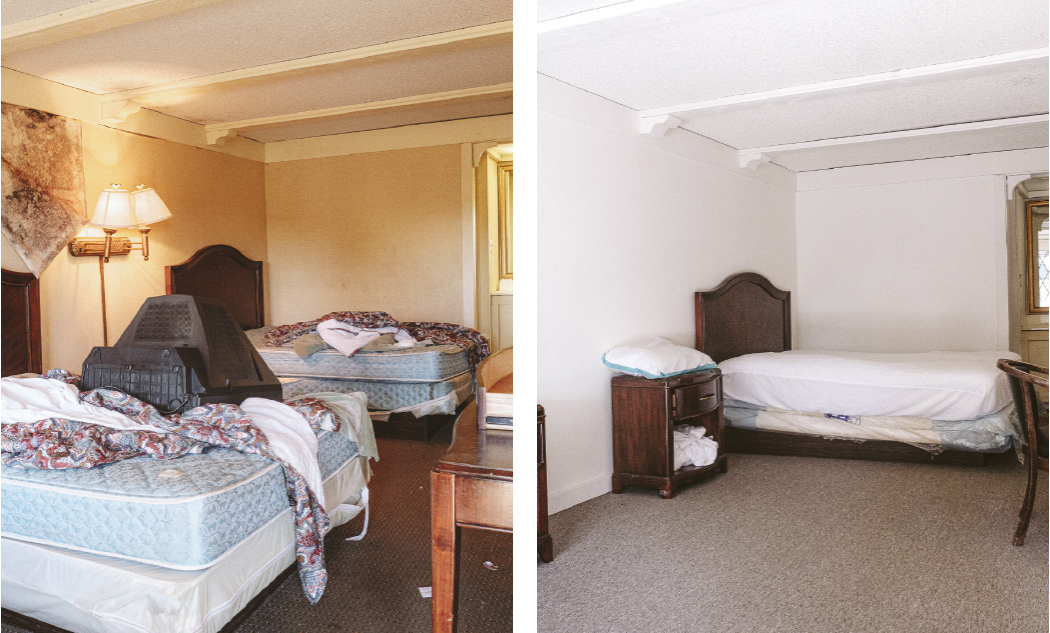After months of paying for hotel rooms for people experiencing homelessness during the COVID-19 pandemic, PACEM and the Thomas Jefferson Area Coalition for the Homeless were in desperate search of a long-term housing solution. When the Red Carpet Inn off Route 29 in Albemarle County was put up for sale last summer, the nonprofits believed they could transform the 40-year-old rundown motel into the permanent emergency shelter they needed.
Thanks to a $4.25 million grant from the Charlottesville Area Community Foundation, the Piedmont Housing Alliance purchased the property in March, and got to work renovating the rooms, which were in varying stages of disrepair. In May, the low-barrier shelter finally opened its doors to all people experiencing homelessness, prioritizing those who are at high risk of becoming severely ill and dying if they contract coronavirus. Since then, it has provided shelter to around 100 people.
Now, the shelter is at capacity, according to PACEM and TJACH, who manage the property together. Sixty-eight people—including a few couples—are currently living in 63 of the former motel’s renovated rooms. Though there are 10 additional renovated rooms, they are not being used right now, due to maintenance issues.
The nonprofits plan to upgrade the remaining 36 unrenovated rooms, so the shelter will have over 100 rooms available for guests. But first, they need to raise about $300,000 for the project.
“There was extensive mold growth in particular in all of the rooms, so we had to strip the wallpaper and professionally clean the walls to make sure the growth was stopped,” says TJACH Executive Director Anthony Haro of the renovations. “And we did basically the same thing for the carpets—they were all removed and replaced.”
The renovation team also had to replace many of the motel’s HVAC units, and fix some electrical and plumbing issues.
Over the past six months, “there have needed to be regular fixes,” adds PACEM Executive Director Jayson Whitehead. “I don’t think we foresaw just how big the property management piece was going to be.”
Despite these challenges, guests have been “really enjoying” the shelter, says Whitehead. In addition to having their own room, all guests receive intensive case management services, along with food, clothing, and other necessities. They are also connected to a variety of community resources, including employment assistance, mental health services, substance abuse treatment, and medical care.
“It’s pretty neat to always see the sense of community that’s developed over here,” says Whitehead. “Everybody has neighbors, and they’ve formed friendships and bonds. That’s the case even with staff and guests.”
“We have regular offerings from Project ID…and there’s a regular UVA health clinic on site weekly,” he adds. “There’s a lot of really directly addressing either health issues or housing barriers.”
Since the Supreme Court ruled against the Biden administration’s federal eviction moratorium extension in August, concern over evictions has heightened across the country. However, TJACH has not seen a local increase in homelessness due to evictions recently, largely thanks to the Virginia Rent Relief Program, says Haro.
Still, to ensure no one has to sleep on the streets during the cold winter months, PACEM will set up its annual temporary congregate shelters at local churches, starting November 6. Meanwhile, TJACH will pay for hotel rooms for high-risk individuals, if they are unable to stay at the shelter at the former Red Carpet Inn.
“To date, there have been no [COVID] outbreaks in our shelter system…which is very much tied to our ability to have private rooms for people,” adds Haro.
The housing advocates have even bigger plans for the former motel in the future: tackling Charlottesville’s affordable housing crisis. Virginia Supportive Housing recently received low-income tax credit awards to build 80 permanent housing units at the site, which will be available to disabled individuals who chronically struggle with homelessness. The project is expected to be completed in 2024.
The Piedmont Housing Alliance will also build 60 affordable housing units—to be rented for no more than 30 percent of the gross income of future residents—on the property.
In addition to financial support from the community, PACEM and TJACH need additional volunteers to help with various tasks at the new shelter, like landscaping and laundry.
And as Charlottesville’s Future Land Use Map and Comprehensive Plan wait for approval from City Council, Haro and Whitehead hope the community will not only advocate for affordable housing development, but also assist in bringing it to fruition.
“It’s how people get out of shelter,” says Haro. “They need a safe and affordable place to move into, and that’s really hard to come by today.”
“We need more than the 80 units of permanent supportive housing and 60 affordable ones—we need 10 times that probably for our community,” he adds.



